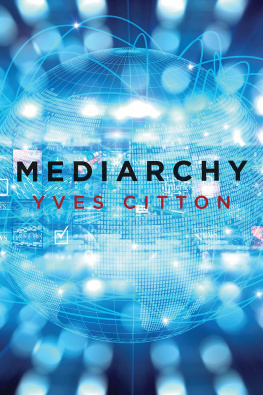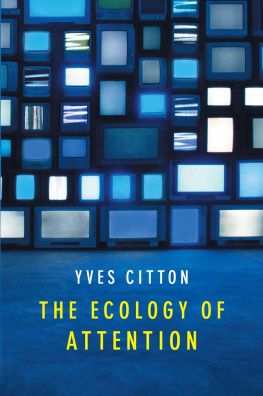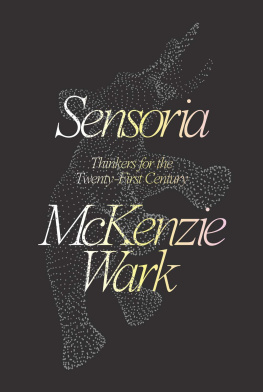Citton - Mediarchy
Here you can read online Citton - Mediarchy full text of the book (entire story) in english for free. Download pdf and epub, get meaning, cover and reviews about this ebook. City: Newark, year: 2019, publisher: Polity Press, genre: Romance novel. Description of the work, (preface) as well as reviews are available. Best literature library LitArk.com created for fans of good reading and offers a wide selection of genres:
Romance novel
Science fiction
Adventure
Detective
Science
History
Home and family
Prose
Art
Politics
Computer
Non-fiction
Religion
Business
Children
Humor
Choose a favorite category and find really read worthwhile books. Enjoy immersion in the world of imagination, feel the emotions of the characters or learn something new for yourself, make an fascinating discovery.
- Book:Mediarchy
- Author:
- Publisher:Polity Press
- Genre:
- Year:2019
- City:Newark
- Rating:4 / 5
- Favourites:Add to favourites
- Your mark:
- 80
- 1
- 2
- 3
- 4
- 5
Mediarchy: summary, description and annotation
We offer to read an annotation, description, summary or preface (depends on what the author of the book "Mediarchy" wrote himself). If you haven't found the necessary information about the book — write in the comments, we will try to find it.
Mediarchy — read online for free the complete book (whole text) full work
Below is the text of the book, divided by pages. System saving the place of the last page read, allows you to conveniently read the book "Mediarchy" online for free, without having to search again every time where you left off. Put a bookmark, and you can go to the page where you finished reading at any time.
Font size:
Interval:
Bookmark:

To Daniel Bougnoux, Maryvonne Arnaud, Philippe Mouillon, Henry Torgue, Franois Deck, lisabeth Sngas, dith Heurgon and my colleagues at LITT & ARTS who, from Cerisy to Grenoble, so generously provide hospitality for experiments in thought and sociality.
To my doctoral students, whose intelligence and generosity reinvigorate my hopes.
And to my friends at the magazine Multitudes, who do not despair of transforming this medium into media.
Yves Citton
Translated by Andrew Brown
polity
First published in French as Mdiarchie Editions du Seuil, 2017. All rights reserved.
This English edition Polity Press, 2019
This work received the French Voices Award for excellence in publication and translation. French Voices is a program created and funded by the French Embassy in the United States and FACE Foundation (French American Cultural Exchange).

French Voices Logo designed by Serge Bloch
This work received support from the French Ministry of Foreign Affairs and the Cultural Services of the French Embassy in the United States through their publishing assistance program.
Polity Press
65 Bridge Street
Cambridge CB2 1UR, UK
Polity Press
101 Station Landing
Suite 300
Medford, MA 02155, USA
All rights reserved. Except for the quotation of short passages for the purpose of criticism and review, no part of this publication may be reproduced, stored in a retrieval system or transmitted, in any form or by any means, electronic, mechanical, photocopying, recording or otherwise, without the prior permission of the publisher.
ISBN-13: 978-1-5095-3341-1
A catalogue record for this book is available from the British Library.
Library of Congress Cataloging-in-Publication Data
Names: Citton, Yves, author.
Title: Mediarchy / Yves Citton.
Other titles: Mdiarchie. English
Description: Cambridge, UK ; Medford, MA : Polity Press, 2019. | Includes bibliographical references and index. | Summary: We think that we live in democracies: in fact, we live in mediarchies. In this major book, Yves Citton maps out the new regime of experience, media and power that he designates by the term mediarchy. This comprehensive and far-reaching book examines the multiple complex ways that the media shape our social, political and personal lives today Provided by publisher.
Identifiers: LCCN 2019001664 (print) | LCCN 2019980854 (ebook) | ISBN 9781509533381 (hardback) | ISBN 9781509533398 (paperback) | ISBN 9781509533411 (epub)
Subjects: LCSH: Mass media Influence. | Mass media and public opinion. | Mass media Political aspects.
Classification: LCC P94 .C5513 2019 (print) | LCC P94 (ebook) | DDC 324.7/3 dc23
LC record available at https://lccn.loc.gov/2019001664
LC ebook record available at https://lccn.loc.gov/2019980854
The publisher has used its best endeavours to ensure that the URLs for external websites referred to in this book are correct and active at the time of going to press. However, the publisher has no responsibility for the websites and can make no guarantee that a site will remain live or that the content is or will remain appropriate.
Every effort has been made to trace all copyright holders, but if any have been overlooked the publisher will be pleased to include any necessary credits in any subsequent reprint or edition.
For further information on Polity, visit our website: politybooks.com
McKenzie Wark
In Mediarchy, Yves Citton has produced a really magnificent work of synthesis. Not many people have really tried to bring the separate worlds of German, English and French media theory into dialog. I dont want to underplay Cittons own distinctive contributions to media theory well exemplified by his first book in translation, on the Ecology of Attention but one of the most impressive things about Mediarchy is its generosity toward the field as a whole and its ambitious attempt to see a common project in media theory.
Let me start by orienting the reader with a condensed account of Cittons position within media theory: Given the popularity of political theory and its omnivorous claims to explain the world, I think it is worth beginning with media theorys critique of it. Political theory assumes an immediacy of the political to itself. Democracy just sort of happens, like a magic spell, as if time and space did not present so many material frictions. To media theory, all political spaces are media spaces. The thing to pay attention to is the mediation that intervenes before there can be any general will.
Of course the absence of a magic spell to harmonize the peoples individual wills is not unknown to political theory. In Hobbes it takes a sovereign, a central point, to keep the people from becoming a rabble. But even here political theory pays little attention to how the sovereigns will is mediated, or what the marks of that mediation might be.
One way of approaching this is to think about what publics are like when they are mediated. When they are mediated, they are synchronized. A people acts in a way that coordinates its actions, and indeed even its thoughts and feelings. They dont have to act, think and feel the same thing. They just have to act, think and feel in the same rhythm. That might be the hallmark of a mediarchy. And once we perceive its hallmark, we might then ask about who or what does the mediating to make it so. Our attention shifts from sovereign power on the one hand and people, publics or crowds on the other, to the material and informational means of connecting and coordinating them.
The next step is to realize that power and people do not pre-exist this mediation, but are constituted in and by it. Then we might start to think about how different historical and technical forms of mediation might shape different powers and peoples. Not in a deterministic way, but rather by offering a range of affordances. The synchronizing effects of mediation make ever more vast and complex forms of social coordination possible. Our actions seem to become more and more immediate in their relation to others. But there is always a bit of delay. Immediacy is a kind of illusion. Delay results in echoes and resonances. Mediation is noisy. Attempts to overcome these problems usually just displace them.
Power that standby concept of political theory might be more a matter of surfing waves of resonance than of command and control. The paradox of power in mediation is that it cannot really command attention, but has to seduce it. Power is a holding of attention in a resonant and noisy media environment. Power has, among other things, to be rhetorical and persuasive. How does power enchant attention?
What then might be a form of counter-power in our prevailing and even accelerating mediarchy? The key metaphor here is delay. Our (almost, seemingly) immediate responses are habitual ones. What one needs is an art in refusing the habitual response. In that refusal, I have time to pay attention not just to the enchanting information but to the form in which it is mediated to me.
Is a media anarchy to counter mediarchy possible? When I pay attention to the form of mediation itself, I can start to see the hierarchies and protocols built into it, the synchronizing procedure by which it solicits me, and I can then also pause to consider my options. I might opt to respond with noise rather than the habitual response. I might produce variations, elaborations I might improvise. Mediarchy is so complex that it cannot coordinate everyone to the same marching tune. If it is to work, it has to allow for variation. That provides the wiggle room for a media politics.
Next pageFont size:
Interval:
Bookmark:
Similar books «Mediarchy»
Look at similar books to Mediarchy. We have selected literature similar in name and meaning in the hope of providing readers with more options to find new, interesting, not yet read works.
Discussion, reviews of the book Mediarchy and just readers' own opinions. Leave your comments, write what you think about the work, its meaning or the main characters. Specify what exactly you liked and what you didn't like, and why you think so.



